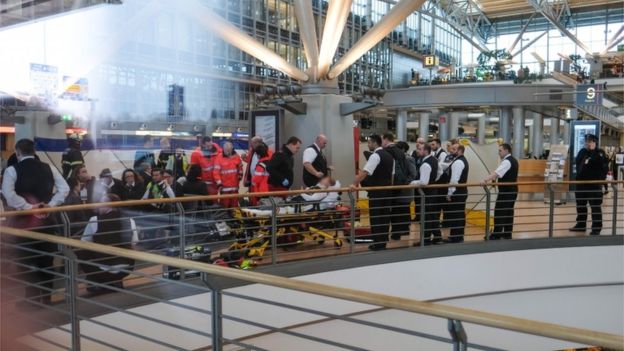Hamburg Airpot in Germany was evacuated Sunday after around 60 people were injured by an irritant gas, thought to be spread through the air conditioning system.
At around 11:00 a.m., in the area where luggage is scanned, passengers reported suffering from “respiratory ailments, nausea, and stinging eyes,” as reported by Yahoo! News, which are common effects of pepper spray.

This event led the airport to cancel many flights and close temporarily. Authorities believe it might have been caused by an unknown “prankster” using the chemical.
Pepper spray is a “lachrymatory agent” commonly used by police in riot or crowd control, or for self-defense, and it is legally sold in Germany. It is not considered lethal but it might contribute to worsening someone’s condition and, in few occasions, leading to death.
“A bad smell has spread in the security area, where passengers and their carry-on luggage are checked,” added Maik Lewerenz.
The affected passengers were taken to the hospital by ambulance, and the rest of them were forced to wait outside the airport under freezing temperatures for at least an hour.
Special areas were available outside of the airport where passengers who were not directly affected but had symptoms of exposure could be examined.
Was this a terrorist attack?
When looking for the source of the incident, firefighters found an empty cartridge that seemed to be the container of the pepper spray, which was allegedly dumped in a trash bin by a passenger.
As The Washington Post reported, police said there was “no evidence” that this event could be related to a terrorist attack.
“Nothing else has been found,” said Rene Schönhardt, spokesman for the Hamburg police. “The fire department didn’t detect any dangerous substances.”
According to Werner Nölken, spokesman for the Hamburg fire department, they never thought it could have been a terrorist attack, but “some clown” did it for no apparent reason rather than making a massive “prank.”
The cartridge was minuscule, around the size of a lipstick, so if it would not have been released into the air conditioning system, the gas would not have affected so many people, explained Nölken.
At around 1:45 p.m., the airport had resumed flights, and some others were redirected to other airports.
Source: The Washington Post
